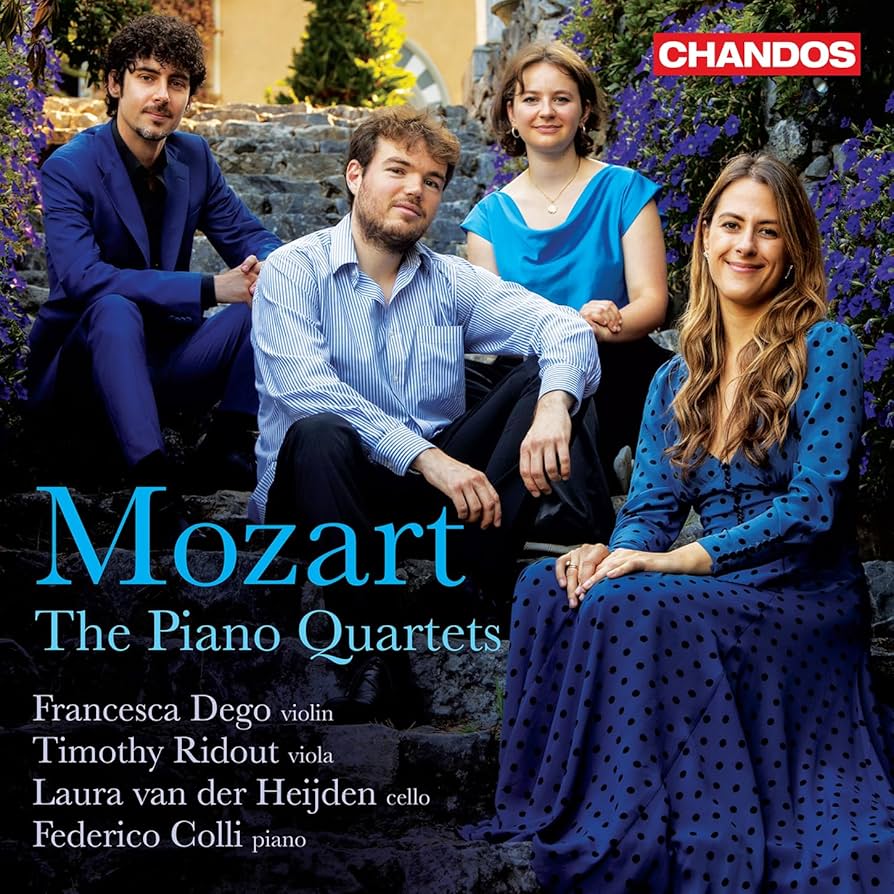MOZART – THE PIANO QUARTETS
A Thoughtful Take on Mozart’s Piano Quartets
Francesca Dego, Timothy Ridout, Laura van der Heijden, and Federico Colli bring us a unique interpretation of Mozart’s Piano Quartets in their recent release, “Mozart: The Piano Quartets.” While these performances showcase undeniable skill and artistry, they may not be to everyone’s taste, as the quartet’s interpretative approach veers away from traditional expectations.
The first quartet, K478, presents a formidable challenge due to its brooding and relentless character. Unfortunately, the quartet’s wider expressive range and slight hesitations, at times, dilute the necessary grim tension that should permeate the piece. Some listeners might find these elements counter-productive. The occasional decorations during repeated passages also distract from the severe atmosphere of the movement. Moreover, the quartet adopts a minimal vibrato approach, which may divide opinions. While it emphasizes plain speaking, it may come across as lacking the richness some listeners associate with Mozart’s music.
Moving on to the central Andante, this is where the quartet’s approach becomes more contentious. Pianist Federico Colli’s introduction suggests a touch of self-consciousness and preciousness that might not sit well with all listeners. Similarly, the finale occasionally drifts into coyness, which is exacerbated by mini-hesitations that disrupt the piece’s flow.
In highlighting these criticisms, it’s important to remember that there’s much to admire in the quartet’s execution. Their performance might resonate with those who appreciate a more modern, expressive interpretation of Mozart. However, for listeners who prefer a more traditional, straightforward approach, there are alternative recordings to explore, such as Dezső Ránki with Éder Quartet or Paul Lewis with Leopold String Trio.
The second quartet, K493, fares somewhat better, but similar tendencies in ornamentation and rubato are evident. The quartet’s emphasis on beauty and elegance might contrast with what some consider the more robust character of Mozart’s quartets. The quartet occasionally misses the opportunity to infuse more energy into the music, particularly in the first movement. In the Larghetto, while the ornamentation is more effective, the touch of rubato remains unsettling.
The quartet’s approach to Mozart is, in part, a matter of personal preference. Some listeners will appreciate Colli’s “highly imaginative and philosophical interpretations,” as described in the booklet notes, while others may long for a more instinctive and straightforward rendition of these beloved pieces. In the finale, the quartet’s interpretation leans toward introspection rather than exuberance, a choice that may not align with everyone’s expectations of Mozart.
One of the highlights of this recording is the insightful booklet notes by Michael O’Loghlin, offering a fresh perspective on well-known works. Additionally, the Chandos recording quality deserves praise, providing a warm and natural sonic experience.
In summary, “Mozart: The Piano Quartets” by Francesca Dego, Timothy Ridout, Laura van der Heijden, and Federico Colli offers a distinctive take on Mozart’s Piano Quartets. While some may find their approach appealing and refreshing, others may prefer more traditional interpretations. This recording is a testament to the variety of interpretations possible in classical music, making it an intriguing addition to Mozart enthusiasts’ collections.

